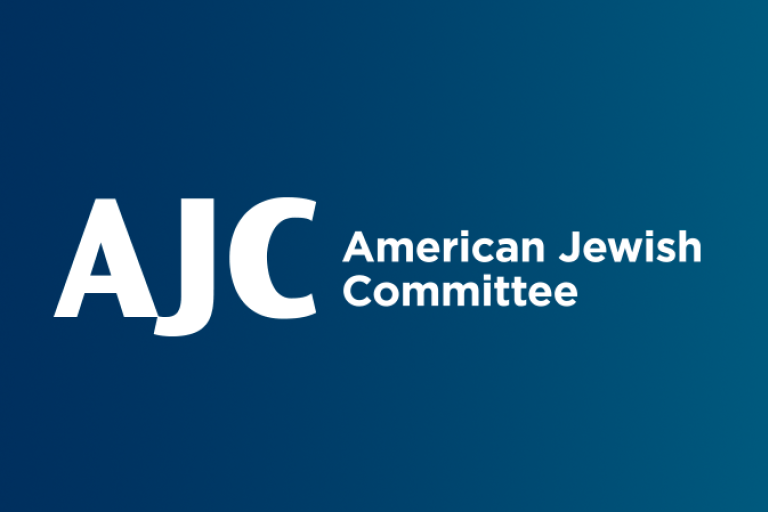August 17, 2023
Polls in Germany suggest the far-right political party Alternative for Germany, or AfD—with its antisemitic, anti-Muslim, anti-EU, and other extreme views—has support from a fifth of German voters. Hear from Felix Klein, the Federal Government Commissioner for Jewish Life in Germany and the Fight Against Antisemitism, and an AJC Project Interchange Alum, on what has contributed to the rise of AfD, why the party threatens German Jews, and the danger it presents to Germany’s democracy.
*The views and opinions expressed by guests do not necessarily reflect the views or position of AJC.
Episode Lineup:
- (0:40) Felix Klein
Show Notes:
Read:
- A Roadmap for America: AJC’s Experience in Europe Is Helping the U.S. Fight Antisemitism
- German Antisemitism Czar Says Calling Israel 'Apartheid' Is Antisemitic
Listen:
Follow People of the Pod on your favorite podcast app, and learn more at AJC.org/PeopleofthePod
You can reach us at: peopleofthepod@ajc.org
If you’ve enjoyed this episode, please be sure to tell your friends, tag us on social media with #PeopleofthePod, and hop onto Apple Podcasts to rate us and write a review, to help more listeners find us.
Transcript of Interview with Felix Klein
Manya Brachear Pashman:
Polls in Germany suggest the far right political party Alternative for Germany has support from a fifth of German voters. In some states, such as Thuringia, the AfD has the support of more than a third. This past weekend, the party met to select its candidates for the European parliament, where it has joined a far right bloc that will boost EU funding for the party.
Here to discuss how that affects Germany's Jewish community is Felix Klein, Germany's first Federal Government Commissioner for Jewish Life in Germany and the Fight against Antisemitism. Felix, welcome back to People of the Pod.
Felix Klein:
Hello, it's a great pleasure to be here again with you.
Manya Brachear Pashman:
So tell us a little bit about Alternative for Germany or AfD, as it's often referred to, and explain for our audience why it was founded 10 years ago?
Felix Klein:
Well, AfD was founded in light of the big financial crisis. It was at the time, about 10 years ago, it was questionable at all whether the euro, as one of the most prestigious and most important European projects, could continue as a currency, as a common European currency, because countries like Greece were heavily indebted. And there was a big discussion whether to, to kick Greece out of the Euro system, or, and it was differently decided. O r to keep it in the EU, of course, and in the Euro system.
And the then-Chancellor Angela Merkel said there is no alternative to that. No alternative for the solution suggested by the government. And there were many people in Germany that were not happy with that, saying, Oh, yes, there is an Alternative for Germany. And that was also the title of this new party, the Alternative for Germany. So it started really, with people who were not happy with the policy towards the European Union and the European solidarity. It didn't start so radical as it is now.
Manya Brachear Pashman:
So how did it become as radical as it is now? And why are we seeing a bit of a resurgence?
Felix Klein:
Well, in times of crisis and uncertainty people are unfortunately, I think that happens when many democracies are more open to populist ideas and parties. And that happens, many countries, including Germany, and AfD, was successful in getting support of those who were not happy with the decisions of the government in Corona, pandemic, from 2020. And now, last year, with the War of Russia, attacking Ukraine, again, we had a strike of uncertainty, energy prices went up in Germany, people are uncertain of what to do, many are not satisfied with the way the government deals with all these issues. And this is another explanation why AFD was able and successful to catch support, particularly in Eastern Germany.
Manya Brachear Pashman:
But it sounds like it also has values that go beyond fiscal responsibility or the economy.
Felix Klein:
Yes, it's beyond the economy. So as I told you, AFD started off with economic issues, but unfortunately, it was attracted by people who have very, very problematic views. And to people who would deny or distort the Holocaust. People will say it was for a long time anyway, Germany was dominated by foreign powers by the EU, and you hear what they're saying this is antisemitic thoughts and narratives. And those people became more influential by the party over time. And what we've seen now, where this party really now chose candidates for the European elections who actually are in against the European Union. Many of them want Germany to leave the EU. There you see how radical it has come, they're also anti-Muslim. This is maybe the most important narrative, anti-migration, anti-Muslim, anti-EU. And of course, with all of that comes also antisemitic narratives. So this is why I'm very, very concerned about the success of this party. And I've expressed it openly in an interview that was published in Welt am Sonntag last Sunday.
Manya Brachear Pashman:
You just mentioned that this party appeals to those who deny or distort the Holocaust. How so?
Felix Klein:
Holocaust distortion is a very common idea in this party. Up to 20% of the Germans think that we should not talk so much anymore about the atrocities committed by the Nazis, that we have to look forward, etc. So, it is not a big surprise that, of course, anything that downgrades, if I may say so, the horrors committed by Germans in the Holocaust, and in the Second World War, in general, is very common.
Very prominent figures of the AfD call really for a cut, which is illogical anyway, you cannot cut yourself off of your own history as a country. But many of these voices call for a different remembrance culture, that it is a shame for Germany that it constructed the Holocaust Memorial in the heart of Berlin. Germany should not be so shameful with itself. And unfortunately, many people agree to this kind of ideas. So holocaust distortion is a big thing. Holocaust denial, it's not so much of a problem. But of course, anything that kind of makes the Holocaust less, less cruel or less incredible, as it was, is welcomed by this party.
Manya Brachear Pashman:
I want to go back to the topic of the European Union, because one of the reasons why Alternative for Germany joined this far-right bloc was to boost EU funding for the party, but yet it's calling for the dissolution of the EU, or at least for Germany to withdraw. Can you explain that calculus?
Felix Klein:
Well, it's, of course very contradictory. On one hand, you call for European funds. And anyway Germany is, I think, the one of the countries that really is taking advantage of the most of the European Union, our industry is heavily export-oriented. One out of four workers in Germany depend on international trade, and of course, it would be very much against German interest to leave the EU. On the other hand, it is a very common narrative in Germany to blame the EU for many developments and decisions taken by the government and they do not have a problem calling these two things at the same time.
Manya Brachear Pashman:
So besides Holocaust distortion, is there other antisemitic rhetoric coming from this party that you see, or fear threatens Jewish life in Germany?
Felix Klein:
Yeah, one of them, clearly I see conspiracy theories being very popular within the AfD voters and a very concrete danger for Jewish life is a motion the AfD has tried to introduce into our parliament that would have banned kosher slaughtering. And fortunately, it didn't go through of course, but if you ban kosher meat, with the argument for animal protection, then of course, you violate the basic right of religion. Because the way you would like to eat is a part of the freedom of religion and fortunately, the motion didn't go through but you'll see that the AfD is really in that very concretely threatening Jewish life in Germany.
Another thing is, of course, they are on first hand very anti Muslim, anti migration. But it is a common fact that anti Muslim hatred is very much linked to antisemitism actually and the way they also talk about Israel as being a big and important factor against the Muslims shows the whole narrative of, to say that Israel is there also to keep Muslims out, is very dangerous. Because I think we all agree that Israel is not against the Muslims, or it's not an anti-Arabic country, as such, but this is what the AfD would like people to believe.
Manya Brachear Pashman:
In other words, championing Israel, for motives that don't belong to Israel, in other words, assigning motives to Israel that don't even exist.
Felix Klein:
It triggers a discussion about Israel, which is absolutely bad, not only for Israel, but also for the Jews living here, because they then have to have an opinion about Israel. And it is complicated enough anyway for the Jews who live in Germany, to explain to non Jews that they are not ambassadors or representatives of the Jewish state here, that they are normal German citizens, and of course, they might have an opinion about Israel. But they are by no means representatives of Israel. I think you have the same discussions in the US, where many people think that American Jews represent the Jewish state.
Manya Brachear Pashman:
So you have also warned that there are not just antisemitic forces, but anti-democratic forces at work in this party. What do you mean by that? I mean, is that in reference to how they denigrate the EU? Or are other other things in play?
Felix Klein:
I refer to the conspiracy theories I already mentioned, which are as such anti democratic, because anybody who believes in a conspiracy theory thing has a problem with democracy. And I would say 99% of the conspiracy theories have an antisemitic content in the end. Because the theory is that a small group of privileged people, in brackets, the Jews, take advantage and profit from a uncertain and difficult situation at the expense of, of everybody, a small group gets an advantage. And this is what leading figures in the AfD also emanate. And of course, this is not only antisemitic, but also anti-democratic.
Manya Brachear Pashman:
They really are one in the same. If you're anti democratic, then you're probably antisemitic and vice versa.
Felix Klein:
Once again, I cannot reiterate enough, that shows that antisemitism is anti-democratic as such, and if you turn it around, every success we have in the fight against antisemitism is a fight for our democracy. It is really directly linked. I think it’s like a litmus test we have in our society.
Manya Brachear Pashman:
So what other questions should people ask to measure a candidate or a party's democratic ideals? Certainly listening out for conspiracy theories or antisemitic rhetoric? Are there other litmus tests?
Felix Klein:
Yeah, of course, well first off, particularly in Germany, every politician should make it clear that he or she distances himself or herself from the horrors of the Nazi past. I mean, our democracy is the answer to the horrors of the Third Reich. And if you don't make that clear, or if you leave it uncertain, then you have a problem. And this is what voters should actively ask candidates: do you really think that the Holocaust is singular in history? Or is it an atrocity, like any other atrocity that was also committed by other people in history? This has to be made very, very clear. And I hope that in the coming elections, people will ask these questions.
Manya Brachear Pashman:
I love what you said about how every victory against antisemitism is a victory for democracy. They really do go hand in hand.
And I want to switch gears a little bit and talk about the EU's Digital Services Act, which takes effect this month in fact. Now for our audience members who aren't familiar with this, this is a new law that will require internet platforms like Facebook and X, formerly Twitter, to not only delete unlawful content, but also provide information about those publishing that information, to the police. Some people would say this is not democratic. Others would say, Oh, yes, it is. So can you speak to that, to that criticism and whether you think this law will make a difference in the fight for democracy and against antisemitism.
Felix Klein:
The main number of antisemitic crimes committed in Germany happens in the internet. Holocaust distortion, particularly, but also incitement of the people. More than two thirds of all antisemitic crimes are committed there. And if you look at the antisemitic incidents below the threshold of crime rate, it's even more. So we have to get and develop new instruments in combating antisemitism online. And the idea is very simple. Whatever is punishable offline should be also punished online. So any sentence you could be punished for, like an incitement of the people in the real world should also be punishable when you do it on the internet. It's very, very simple. And that is, this is a very simple idea of the EU Digital Services Act.
And in the past, of course, it was very difficult for police and prosecutors to trace the perpetrators and the main people now we want to involve, or big organizations, is the internet platforms because they have access to the IP addresses of those who spread antisemitism and hate speech. And we have to make them responsible.
So I think this is a very, very good instrument in fighting antisemitism online, I would even say it is a game changer. We have had pilot projects in Germany, where prosecutors who actually then found out with their means the perpetrators who spread antisemitism and will then get counter pressure from the state. So for instance, when the police car is in front of their homes, and the neighbors are watching, these people do not spread antisemitism anymore, they are impressed that the states can defend itself or defend its citizens and go against hate speech.
I think this will be very effective. And we I'm very happy that the federal police office here in Germany has now founded offices to and departments to be ready for the new law. And as you said, yeah, it is getting affected soon. And this is, I think, a very good example, that democracy is not self-evident. It has to defend itself. And freedom of speech has its limits, at least in our European concept. You cannot say anything you would like if you violate the rights of others. And this is a clear case.
Manya Brachear Pashman:
The White House just recently released the US national strategy to counter antisemitism. And you and other envoys traveled here to the United States to advise the officials who were developing that strategy. In fact, the last time you were on this podcast, it was to talk about that trip. Did you talk about the limits on free speech during that trip with officials, the need to hold social media platforms accountable? Because what the EU is doing is not happening here. Not yet, at least.
Felix Klein:
We talked about this, of course, but I'm aware of the legal situation in the US where you have a different concept of the freedom of speech, that the First Amendment of the US Constitution is, there problematic in that case to limit that. I hope that US administration finds ways nevertheless to go against, or to be effective against hate speech and antisemitism online and I think the right way is to talk to the internet platforms, to provide us– many of them have their headquarters in the US and earn much money in the US. So, there should be ways in getting them to limit or to do their responsible share of maintaining the US democracy too.
Manya Brachear Pashman:
Felix, thank you so much for joining us.
Felix Klein:
It was a pleasure. All the best, and it's always great to be together with AJC.





